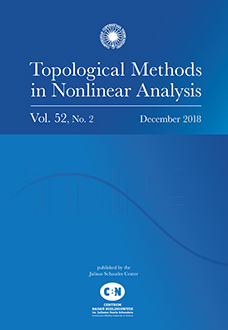Abstract
For a scalar, first order ordinary differential equation which depends periodically on time, Massera's Theorem says that the existence of a bounded solution implies the existence of a periodic solution. Though the statement is false when periodicity is replaced by quasi-periodicity, solutions with some kind of recurrence are anyway expected when the equation is quasi-periodic in time. Indeed we first prove that the existence of a bounded solution implies the existence of a solution which is quasi-periodic in a weak sense. The partial differential equation, having our original equation as its equation of characteristics, plays a key role in the introduction of this notion of weak quasi-periodicity. Then we compare our approach with others already known in the literature. Finally, we give an explicit example of the weak case, and an extension to higher dimension for a special class of equations.
Citation
Rafael Ortega. Massimo Tarallo. "Massera's theorem for quasi-periodic differential equations." Topol. Methods Nonlinear Anal. 19 (1) 39 - 61, 2002.
Information





